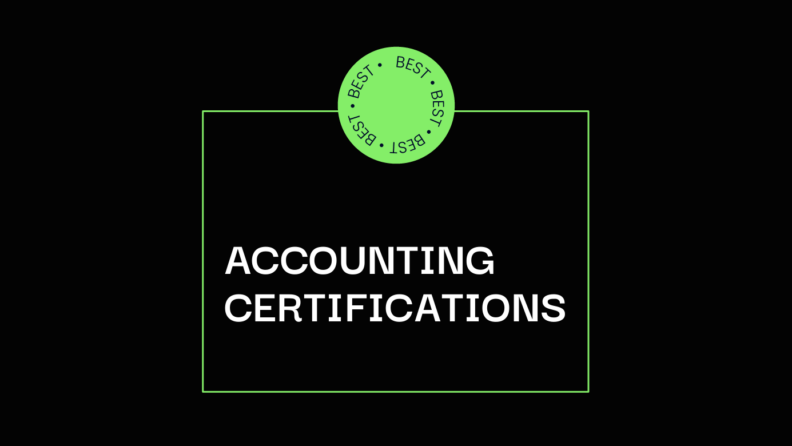With tax laws, reporting standards, and financial tools evolving constantly, staying ahead of current accounting practices requires more than just experience—it demands ongoing education. Without up-to-date skills and insights, you risk inefficiencies in your team and missed opportunities to optimize your company’s financial performance.
That’s where targeted accounting certifications come in, offering a way to sharpen your expertise and ensure your organization stays competitive.
As a financial controller, I’ve been in the trenches managing budgets, audits, and financial strategy. I understand the challenges you face in leading your accounting teams while making high-stakes decisions.
That's why, to make your search easier, I’ve reviewed top accounting certifications for CFOs and financial leaders. These programs offer practical insights to boost your expertise, refine your leadership, and drive your organization forward.
Best Accounting Certifications Shortlist
- Certified Public Accountant (CPA) — Best for public accounting expertise
- Chartered Professional Accountant (CPA) — Best for professional accounting in Canada
- Certified Management Accountant (CMA) — Best for management accounting and financial management
- Chartered Financial Analyst (CFA) — Best for investment analysis and portfolio management
- Certified Internal Auditor (CIA) — Best for internal auditing standards
- Certified Information Systems Auditor (CISA) — Best for information systems audit control
- Enrolled Agent (EA) — Best for federal tax matters
- Certified Fraud Examiner (CFE) — Best for fraud prevention and detection
- Certified Payroll Professional (CPP) — Best for payroll management
- Accredited Business Accountant (ABA) — Best for small business accounting
- Bookkeeping Certification — Best for bookkeeping proficiency
- Financial Risk Manager (FRM) — Best for financial risk management
- Certified Financial Planner (CFP) — Best for financial planning and advice
- Chartered Global Management Accountant (CGMA) — Best for global management accounting
- Certified Government Financial Manager (CGFM) — Best for government financial management
- Certified in Financial Management (CFM) — Best for financial management expertise
- Certified Treasury Professional (CTP) — Best for corporate treasury management
- Financial Services for Internal Auditors Certificate (FSAC) — Best for financial services auditing
Overview of the Best Accounting Certifications
Below are my detailed summaries of the best accounting certifications on my shortlist.
1. Certified Public Accountant (CPA)
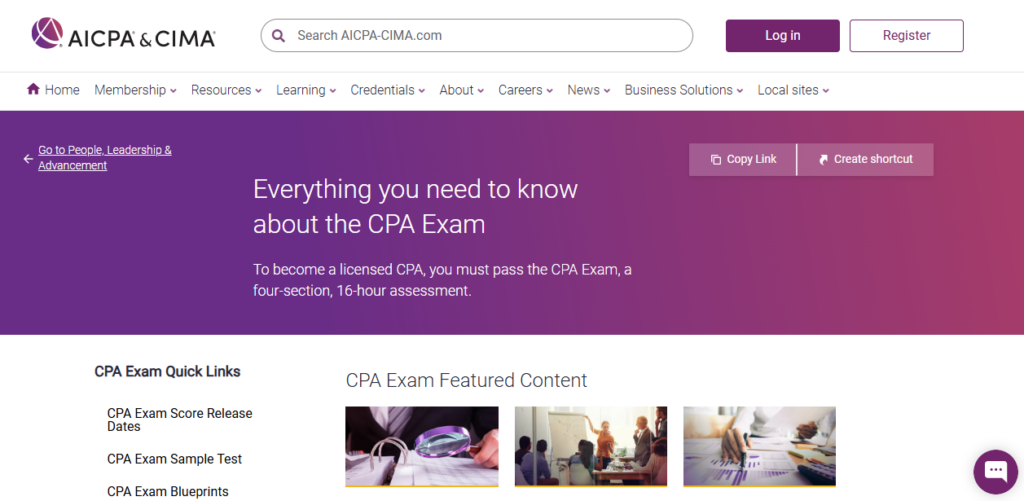
The Certified Public Accountant (CPA) designation is a professional credential for accountants in the United States. This certification signifies proficiency in accounting and the ability to perform financial audits, prepare tax returns, and provide sound financial advice.
Issued by: AICPA
Focus:
- Financial auditing
- Tax preparation and planning
- Financial reporting
- Regulatory compliance
- Advisory services
Prerequisites:
- Education: Bachelor's degree in accounting or related field
- Exam: Yes
- Other Certifications Required: None
Renewability: Continuing professional education (CPE) credits are typically required to maintain the license.
Price: Varies by state and educational path; exam fees and preparatory materials can also add to the cost.
Who It’s For: Individuals aiming to excel in public accounting.
2. Chartered Professional Accountant (CPA)
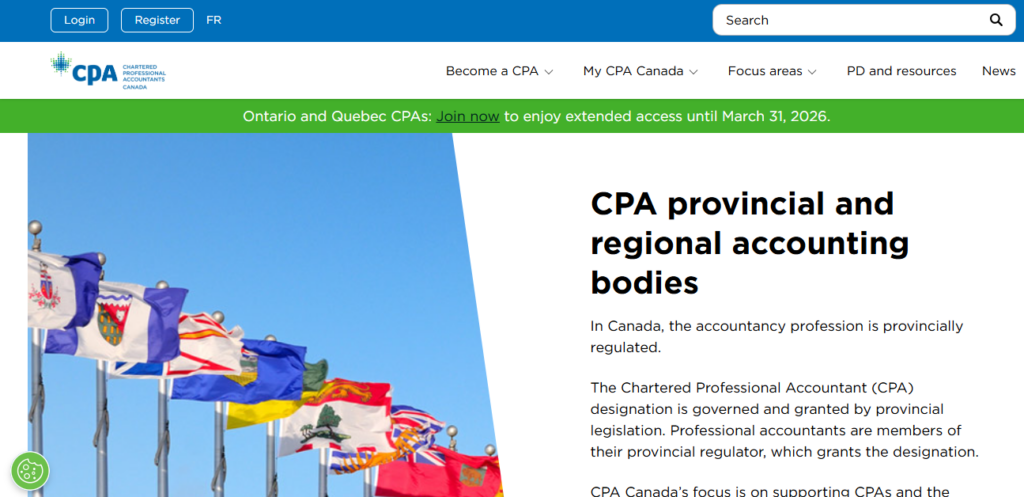
The Chartered Professional Accountant (CPA) certification is Canada’s premier designation for accounting professionals. It validates a candidate’s expertise in accounting, finance, and strategic management, ensuring they meet the highest standards of competency and ethics.
Issued by: CPA Canada
Focus:
- Financial reporting
- Management accounting
- Taxation
- Strategy and governance
- Audit and assurance
Prerequisites:
- Education: Completion of a recognized undergraduate degree with specific accounting courses
- Work Experience: Minimum 30 months of relevant, supervised work experience
- Exam: Successful completion of the Common Final Examination (CFE)
- Other Certifications Required: None
Renewability: Renewable annually; requires meeting continuing professional development (CPD) requirements.
Price: Varies by provincial or regional accounting body; typically includes membership fees and exam costs.
Who It’s For: Accounting professionals seeking to excel in Canada’s accounting landscape.
3. Certified Management Accountant (CMA)
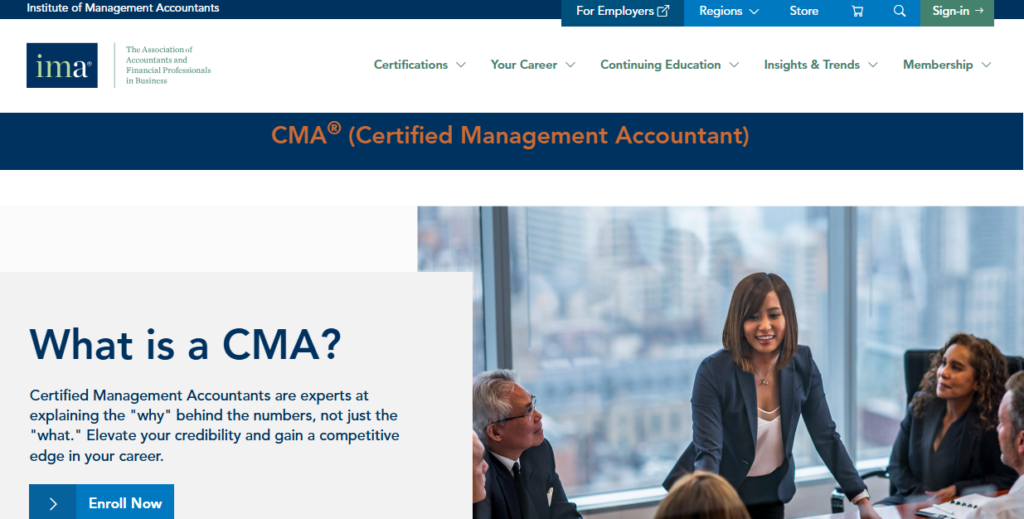
The Certified Management Accountant (CMA) demonstrates financial reporting, planning, performance management, and risk management proficiency. The certification consists of two parts, covering various competencies including financial statement analysis, corporate finance, and professional ethics.
Issued by: Institute of Management Accountants (IMA)
Focus:
- Financial reporting
- Planning and budgeting
- Performance management
- Risk management
- Financial statement analysis
- Corporate finance
- Professional ethics
Prerequisites:
- Education: Bachelor's degree
- Work Experience: 2 years in management accounting or financial management
- Exam: Two-part examination
- Other Certifications Required: None
Renewability: Yes, requires periodic continuing education to maintain the certification.
Price:
- Professional members:
- CMA Entrance Fee: $300
- Exam Fee: $495 per part
- IMA Membership Fee: $295
- Student/Academic members:
- CMA Certification Entrance Fee: $225
- Exam Fee: $370 per part
- IMA Membership Fee: $49-$160
Who It’s For: Accounting and finance professionals who aim to excel in management accounting roles.
4. Chartered Financial Analyst (CFA)
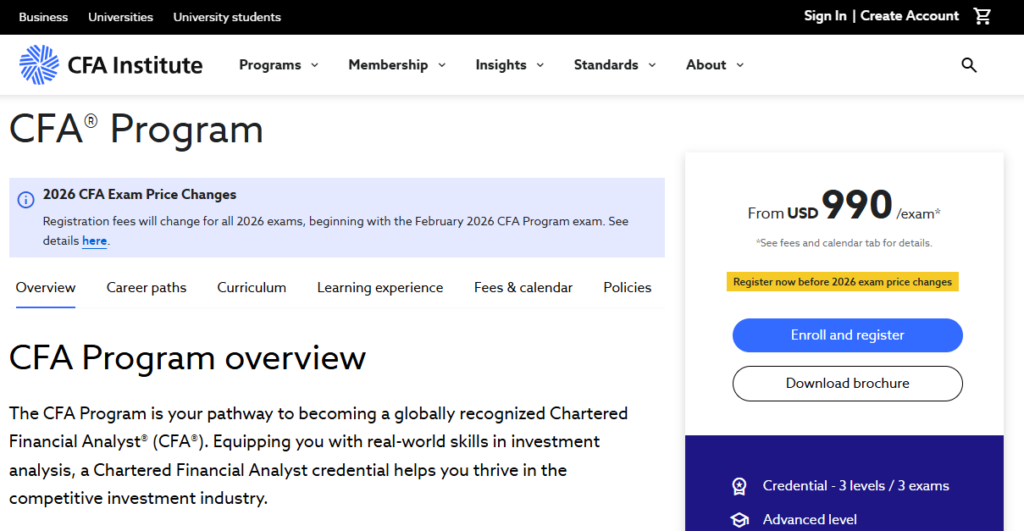
The Chartered Financial Analyst (CFA) program is a globally recognized professional credential offered by the CFA Institute. It’s designed to provide a strong foundation in advanced investment analysis and real-world portfolio management skills. There are 3-tiers to the CFA, making it valuable for financial professionals at all stages.
Issued by: CFA Institute
Focus:
- Investment tools
- Asset valuation
- Portfolio management
- Wealth planning
Prerequisites:
- Education: Bachelor's degree or equivalent education/work experience
- Work Experience: Four years of professional work experience in the investment decision-making process
- Exam: Successful completion of all three exam levels
- Other Certifications Required: None
Renewability: Yes, it requires adherence to the CFA Institute's Code of Ethics and Standards of Professional Conduct annually.
Price: Starts at $990
Who It’s For: Finance professionals who want to demonstrate their investment management expertise and ethical financial decision-making expertise.
5. Certified Internal Auditor (CIA)
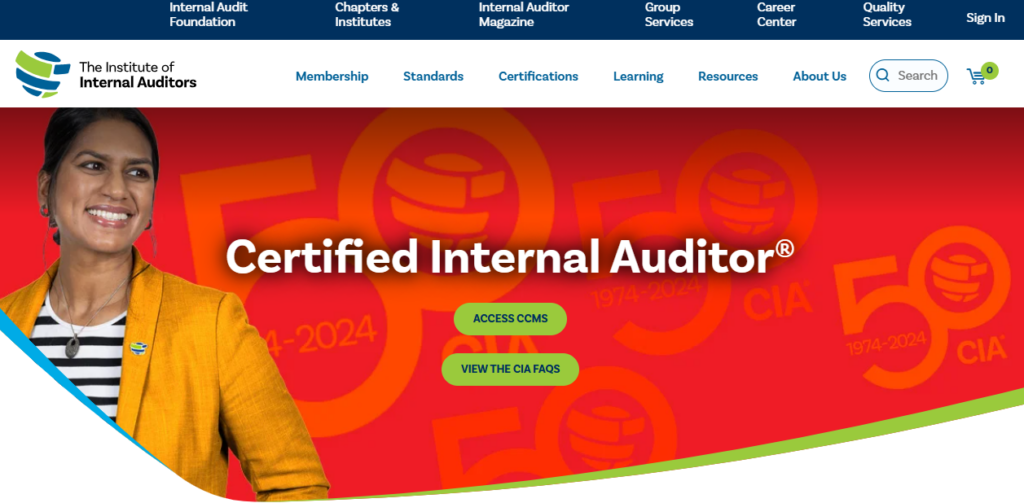
The Certified Internal Auditor (CIA) is often referred to as the gold standard for internal auditors, providing professionals with enhanced credibility, career advancement opportunities, and increased earning potential. The Institute of Internal Auditors (IIA) offers extensive resources to assist candidates, including a Certification Candidate Management System (CCMS) and options for expedited certification through challenge exams.
Issued by: The Institute of Internal Auditors (IIA)
Focus:
- Internal audit practices
- Risk management
- Control processes
- Governance
Prerequisites:
- Education: Bachelor's degree or higher
- Work Experience: Varies based on education level (e.g., 2 years for a bachelor’s degree)
- Exam: Three-part CIA exam
- Other Certifications Required: None, but active CPA or CA holders may qualify for a Challenge Exam
Renewability: Yes, it requires completion of continuing education annually.
Price: Different for each step: application, exam 1, exam 2, and exam 3.
- Member: From $120-$310
- Non-member: From $240-$445
- Student: From $65-$245
Who It’s For: Professionals who wish to demonstrate their proficiency and commitment to internal auditing.
6. Certified Information Systems Auditor (CISA)
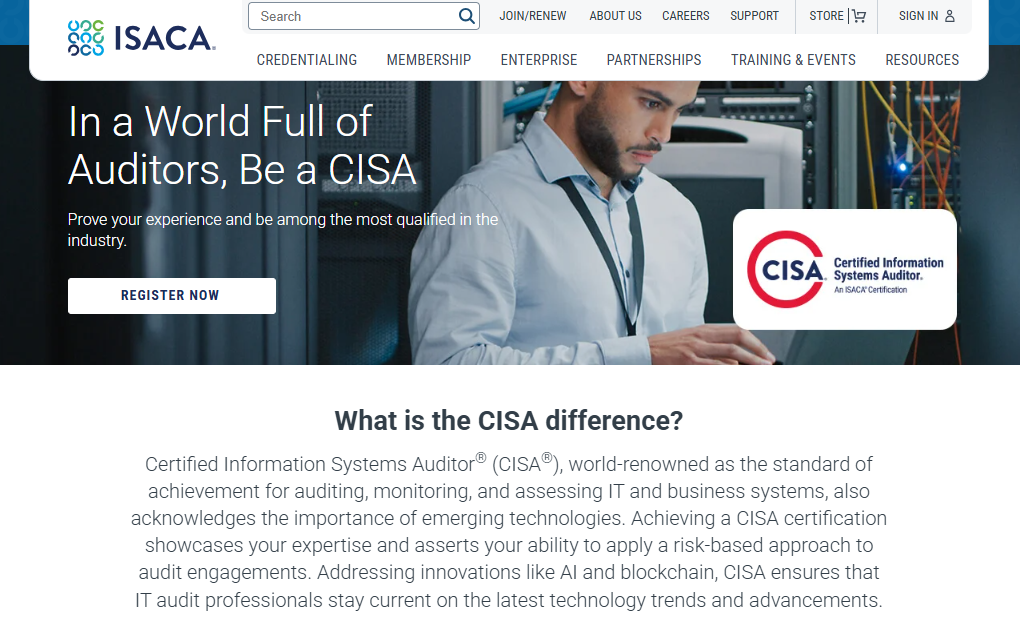
The Certified Information Systems Auditor (CISA) demonstrates expertise in auditing, controlling, and ensuring the security of information systems. It establishes proficiency in assessing vulnerabilities and implementing IT controls in compliance with industry standards.
Issued by: ISACA
Focus:
- Information systems auditing process
- Governance and management of IT
- Information systems acquisition, development and implementation
- Information systems operations and business resilience
- Protection of information assets
Prerequisites:
- Education: Not required, but a strong understanding of IT and audit processes is beneficial
- Work Experience: Typically requires five years of professional work experience in information systems auditing, control, or security
- Exam: Candidates must pass a comprehensive exam
- Other Certifications Required: None
Renewability: Yes, the certification can be renewed through continuing professional education (CPE).
Price:
- Member: $575 exam cost + $50 processing fee
- Non-member: $760 exam cost + $50 processing fee
Who It’s For: Financial professionals looking for career advancement and salary growth potential in IT.
7. Enrolled Agent (EA) - Best for federal tax matters
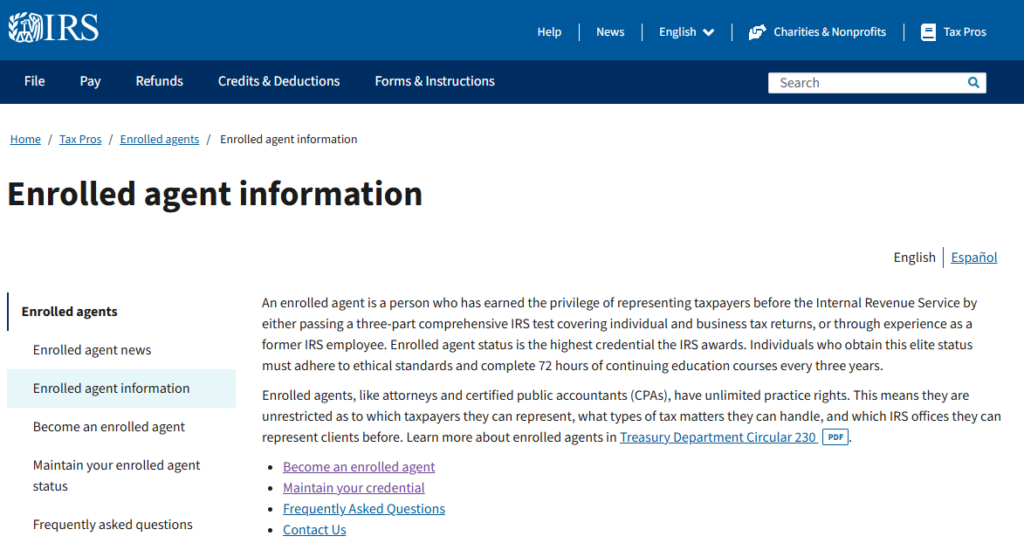
An Enrolled Agent (EA) is a tax professional authorized by the U.S. government to represent taxpayers in matters regarding the Internal Revenue Service (IRS). This credential is the highest awarded by the IRS, signifying comprehensive knowledge of the U.S. tax code.
Individuals who obtain this status must adhere to ethical standards and fulfill continuing education requirements.
Issued by: Internal Revenue Service (IRS)
Focus:
- Individual and business tax codes
- Tax policies and practices
- Tax representation before the IRS
Prerequisites:
- Education: No specific educational requirements
- Work Experience: Not required unless following the IRS experience path
- Exam: Must pass a comprehensive three-part exam covering individual, business, and representation-focused tax topics
- Other Certifications Required: None
Renewability: Yes, it requires renewal every three years with 72 hours of continuing education.
Price: $140
Who It’s For: Tax professionals who wish to represent clients before the IRS.
8. Certified Fraud Examiner (CFE) - Best for fraud prevention and detection
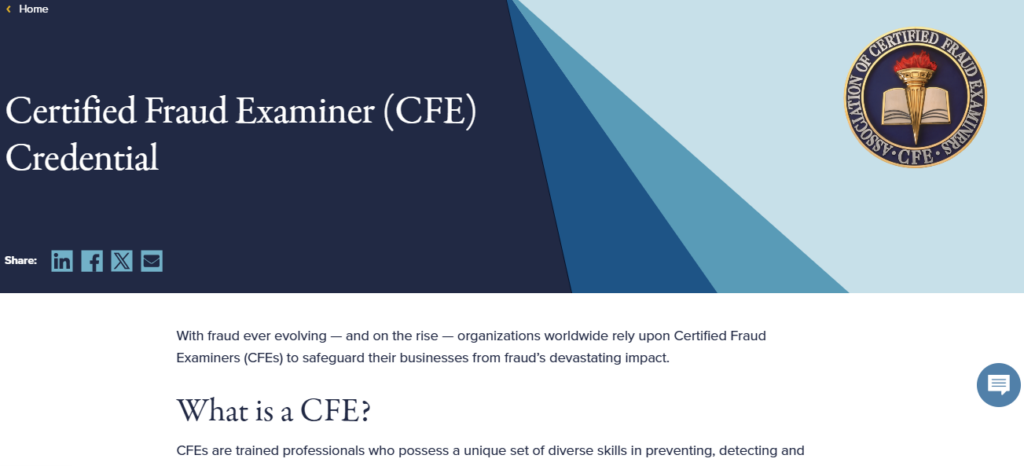
The Certified Fraud Examiner (CFE) credential, offered by the Association of Certified Fraud Examiners (ACFE), equips professionals with specialized fraud prevention, detection, and investigation skills. CFEs are trained extensively in understanding financial transactions, investigative techniques, and anti-fraud program design. This certification provides them with the necessary tools and recognition in the field of fraud examination.
Issued by: Association of Certified Fraud Examiners (ACFE)
Focus:
- Fraud prevention and deterrence
- Financial transactions and fraud schemes
- Investigation
- Law
Prerequisites:
- Education: Bachelor's degree
- Work Experience: At least two years of relevant professional experience
- Exam: Four sections with a minimum passing score of 75% in each
- Other Certifications Required: Not required, but additional certifications like Certified Internal Auditor can enhance opportunities
Renewability: Yes, requires completion of 20 hours of continuing professional education (CPE) annually.
Price: $475
Who It’s For: Auditors, investigators, and compliance officers looking to advance their careers in anti-fraud roles.
9. Certified Payroll Professional (CPP) - Best for payroll management
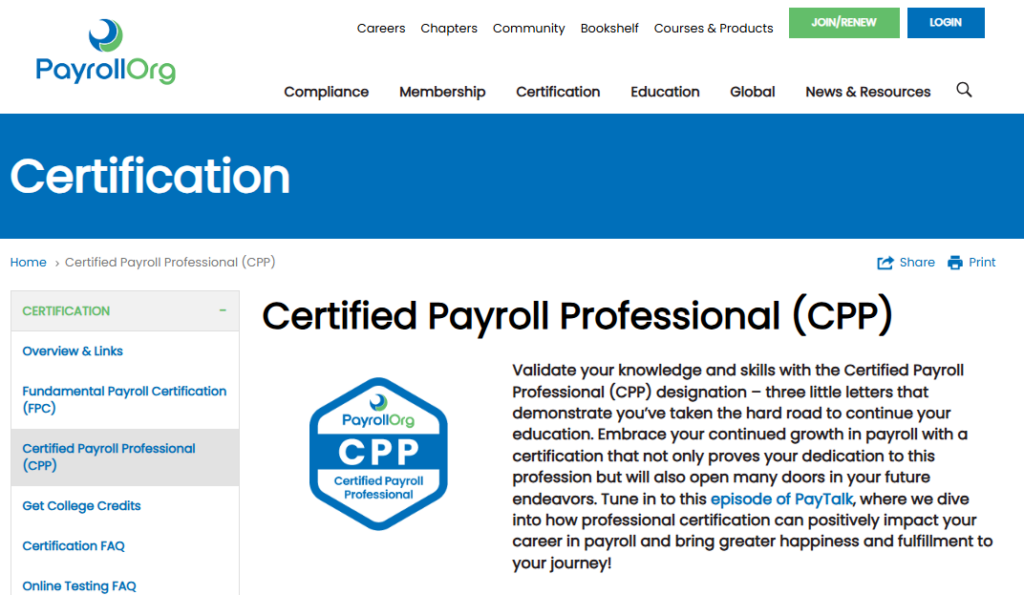
The Certified Payroll Professional (CPP) demonstrates expertise in payroll management, ensuring compliance with federal regulations, efficient payroll processes, and an advanced understanding of payroll systems and practices.
Issued by: PayrollOrg
Focus:
- Essential payroll knowledge
- Compliance with payroll regulations
- Payroll management skills
Prerequisites:
- Education: Bachelor’s degree or higher
- Work Experience: Minimum of three years in payroll
- Exam: Yes
- Other Certifications Required: None
Renewability: Yes, through continuing education or by retaking the exam within 5 years.
Who It’s For: Professionals looking to advance their careers in payroll and related areas.
10. Accredited Business Accountant (ABA) - Best for small business accounting
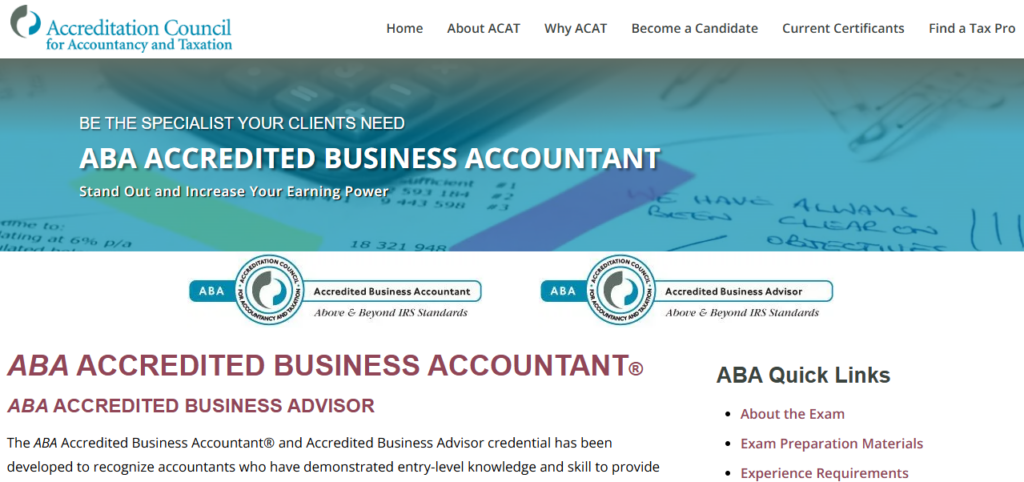
The Accredited Business Accountant (ABA) certification is designed to certify accountants who have demonstrated entry-level proficiency in key areas such as financial accounting, taxation, managerial accounting, business law, and ethics.
This credential is particularly focused on the needs of small to medium-sized businesses in the United States. By obtaining the ABA certification, accountants can enhance their credibility and demonstrate their competence in the accounting and taxation fields.
Issued by: Accreditation Council for Accountancy and Taxation (ACAT)
Focus:
- Financial accounting
- Taxation
- Managerial accounting
- Business law
- Ethics
Prerequisites:
- Education: Minimum of two years of college-level accounting or equivalent
- Work Experience: Three years of professional accounting experience, or one year if combined with two years of college-level education
- Exam: Two-part exam
- Other Certifications Required: None
Renewability: Yes ,it requires 40 Continuing Professional Education (CPE) hours annually and adherence to ethical standards.
Price: $400
Who It’s For: Accountants seeking to establish credibility and expertise in small to medium-sized business environments.
11. Bookkeeping Certification - Best for bookkeeping proficiency
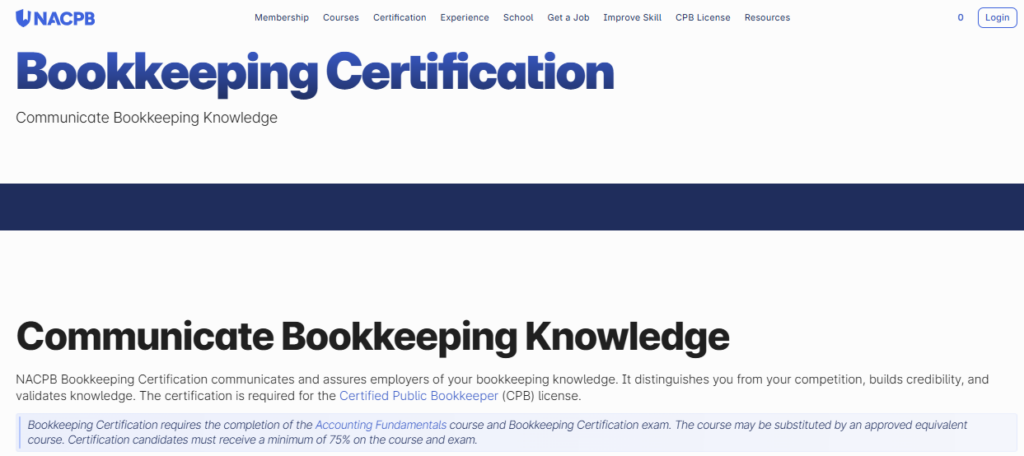
The Bookkeeping Certification validates proficiency in essential bookkeeping skills, ensuring candidates are equipped to manage financial records, track transactions, and maintain accurate accounting systems.
Issued by: National Association of Certified Public Bookkeepers (NACPB)
Focus:
- Accounting fundamentals
- Bookkeeping practices
- Financial reporting
- Use of accounting software
Prerequisites:
- Education: Completion of the Accounting Fundamentals course or an equivalent accredited course
- Work Experience: Relevant bookkeeping experience
- Exam: Pass the Uniform Bookkeeping Certification Examination
- Other Certifications Required: None
Renewability: Yes, it can be renewed.
Price:
- Member: $80
- Non-member: $100
Who It’s For: Professionals who want to demonstrate their proficiency in bookkeeping.
12. Financial Risk Manager (FRM) — Best for financial risk management
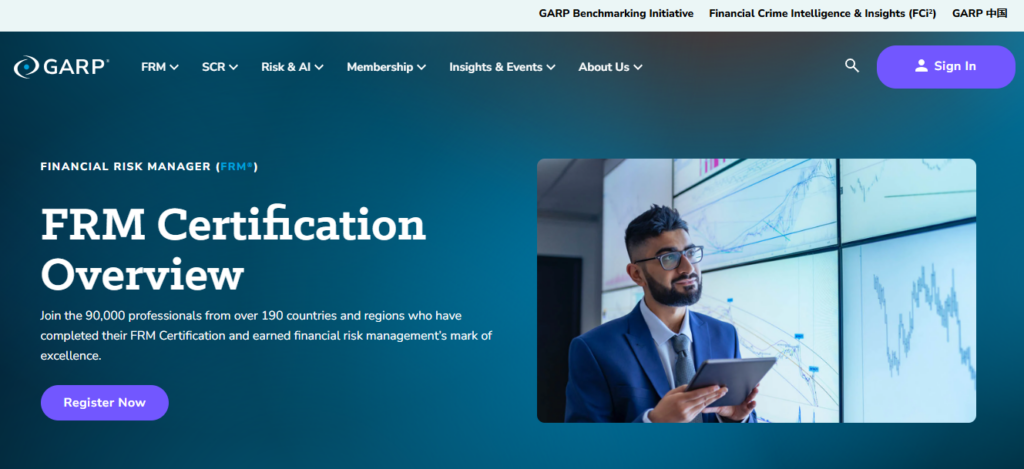
The Financial Risk Manager (FRM) certification demonstrates expertise in assessing and managing financial risk, equipping professionals with the knowledge to identify, analyze, and mitigate potential risks in financial markets and institutions.
Issued by: Global Association of Risk Professionals (GARP)
Focus:
- Risk management frameworks
- Market risk and credit risk
- Operational and integrated risk management
- Financial products and investment management
- Regulatory and ethical standards
Prerequisites:
- Work Experience: Two years of relevant work experience in risk management or a related field (can be completed after passing the exam)
- Exam: Completion of a two-part FRM exam series
- Other Certifications Required: None
Renewability: Renewable annually; requires ongoing membership with GARP and adherence to continuing professional development (CPD) guidelines.
Price: From $400–$1,000
Who It’s For: Finance and risk management professionals.
13. Certified Financial Planner (CFP) - Best for financial planning and advice
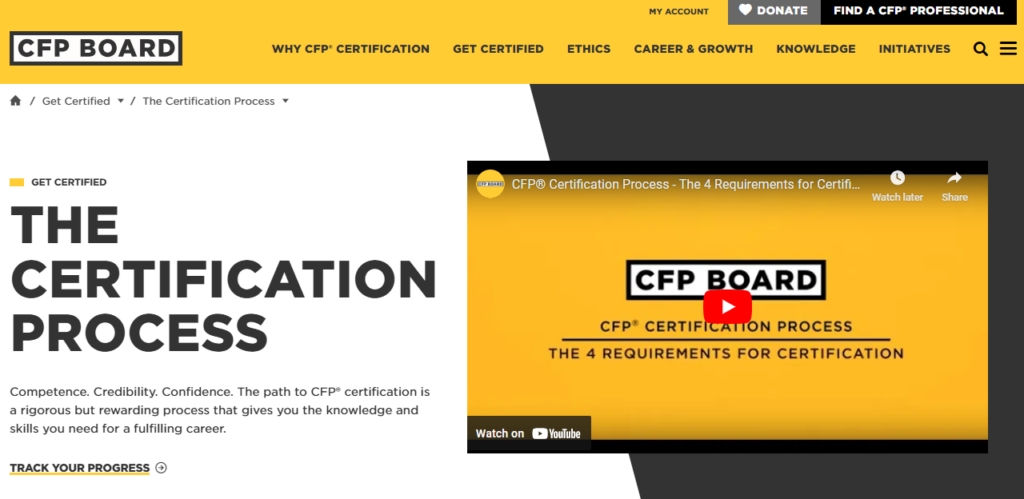
The Certified Financial Planner (CFP) establishes competence in providing financial planning services, focusing on creating personalized strategies to help clients meet their financial goals while adhering to ethical and professional standards.
Issued by: CFP Board
Focus:
- Advanced financial planning
- Investment strategies
- Retirement planning
- Tax planning and optimization
- Estate planning
Prerequisites:
- Education: Complete coursework through a CFP Board Registered Program and hold a bachelor's degree from an accredited institution
- Work Experience: 6,000 hours of professional experience or 4,000 hours of apprenticeship in financial planning
- Exam: Pass the CFP® exam
- Other Certifications Required: None
Renewability: Yes, it requires ongoing education and adherence to ethical standards.
Who It’s For: Individuals aiming to establish themselves as credible and knowledgeable financial advisors.
14. Chartered Global Management Accountant (CGMA) - Best for global management accounting
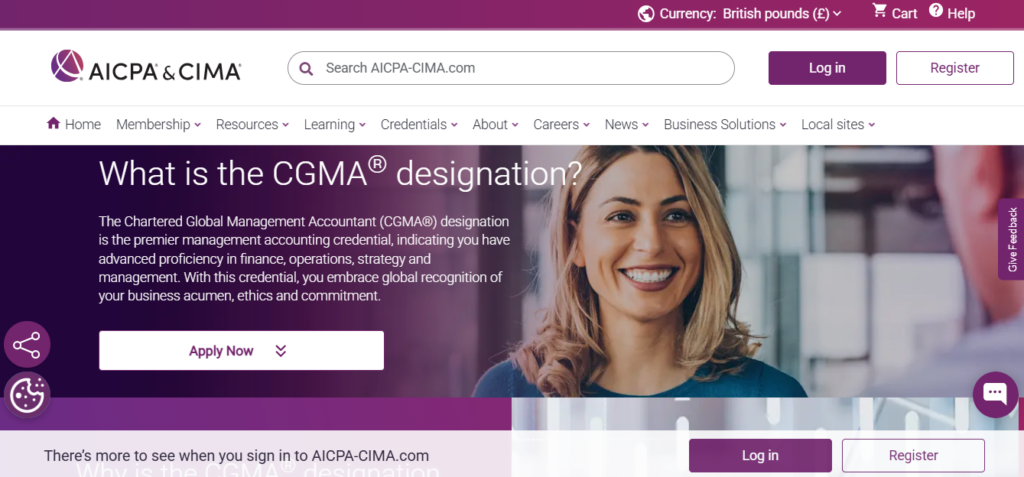
The Chartered Global Management Accountant (CGMA) designation is recognized as a leading credential in management accounting. It signifies advanced proficiency in financial management, operations, strategy, and management, providing holders with global recognition for their business acumen, ethics, and commitment.
Issued by: AICPA and CIMA
Focus:
- Finance
- Operations
- Strategy
- Management
Prerequisites:
- Education: A relevant degree or equivalent qualification
- Work Experience: At least three years of relevant work experience in accounting and finance
- Exam: Completion of the CGMA exam, which includes a case study and tests on theoretical and practical knowledge
- Other Certifications Required: Completion of CIMA certification is typically required
Renewability: Yes, the certification requires ongoing professional development and renewal to maintain the credential.
Price: Varies by state and educational path; exam fees and preparatory materials can also add to the cost.
Who It’s For: Accounting professionals who seek to enhance their expertise in global management accounting.
15. Certified Government Financial Manager (CGFM) - Best for government financial management
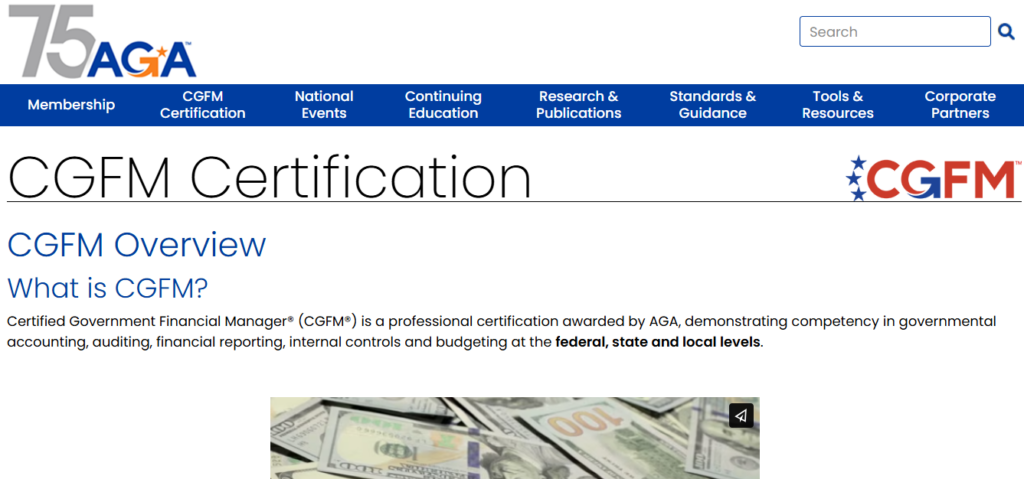
The Certified Government Financial Manager (CGFM) validates expertise in government financial management, demonstrating knowledge of public financial systems, accountability, and control at the federal, state, and local levels.
Issued by: Association of Government Accountants (AGA)
Focus:
- Governmental accounting
- Auditing
- Financial reporting
- Internal controls
- Budgeting
Prerequisites:
- Education: Bachelor's degree from an accredited institution
- Work Experience: At least two years of professional-level experience in government financial management
- Exam: Pass three comprehensive CGFM examinations
- Other Certifications Required: None
Renewability: Yes, requires adherence to AGA's Code of Ethics and completion of continuing professional education (CPE) requirements.
Price: Requires a membership
- Student: Free
- Professors: Free for one year
- Retired: $35 per year
- Early Career: $45 per year
- Government: $100 per year
- Private Sector: $160 per year
Who It’s For: Professionals in government financial management who seek to enhance their career opportunities.
16. Certified Finance Manager (CFM) - Best for financial management expertise
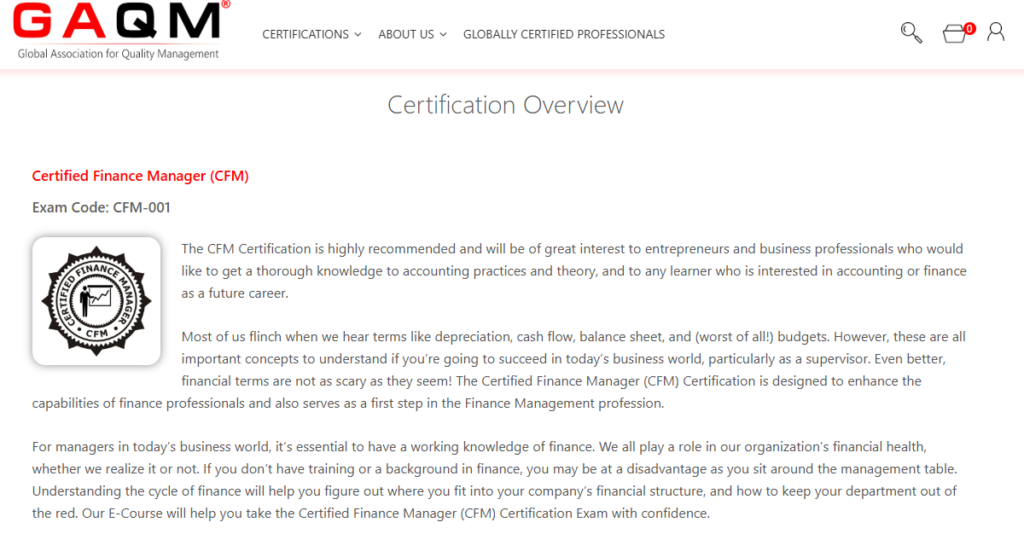
The Certified Finance Manager (CFM) certification aims to equip finance professionals with the necessary skills to contribute effectively to their organization's financial health. The CFM certification serves as a foundational step for those pursuing a career in finance management.
Issued by: GAQM
Focus:
- Accounting
- Budgeting
- Financial reporting
- Cash flow management
- Depreciation
Prerequisites:
- Education: Not required
- Work Experience: Not required
- Exam: Must obtain a 70% passing score
- Other Certifications Required: None
Renewability: No.
Price:
- Standard Package: $70
- Exam Voucher: $190
- Premium Package: $220
Who It’s For: Business professionals and entrepreneurs who wish to enhance their financial management skills.
17. Certified Treasury Professional (CTP) - Best for corporate treasury management
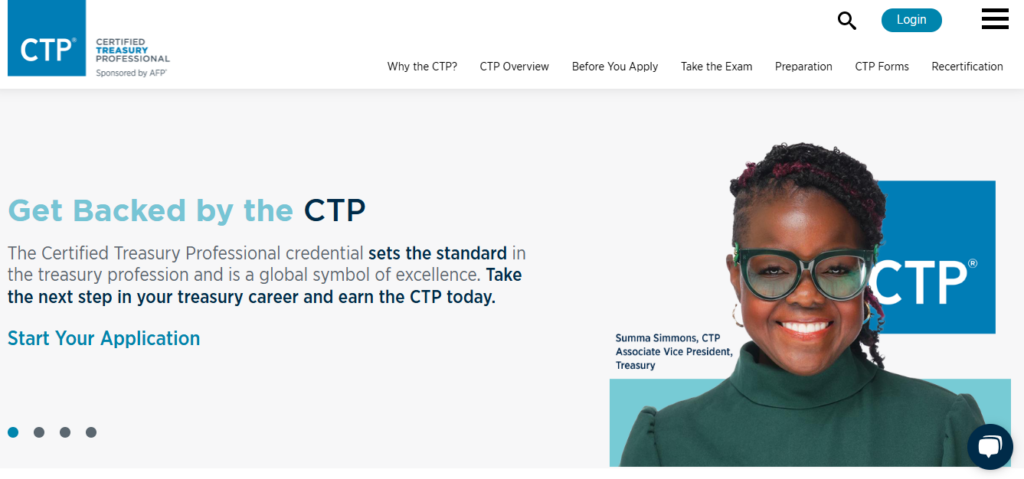
The Certified Treasury Professional (CTP) certification validates expertise in treasury management, equipping professionals with the knowledge to manage liquidity, optimize cash flow, and implement financial risk management strategies in corporate settings. It signifies a commitment to professional excellence and continuous learning in the treasury field.
Issued by: Association for Financial Professionals (AFP)
Focus:
- Treasury management
- Cash management
- Financial risk management
- Liquidity management
- Corporate finance
Prerequisites:
- Education: Graduate or Master’s Degree in business, finance, or accountancy
- Work Experience: Minimum of two years of full-time work experience in a relevant field
- Exam: Passing the CTP exam
- Other Certifications Required: None
Renewability: Yes, requires recertification every three years.
Price:
- AFP Member:
- Early Registration: $925
- Final Deadline: $1,025
- Non-member:
- Early Registration: $1,320
- Final Deadline: $1,420
Who It’s For: Professionals in treasury management seeking to validate their expertise and advance their careers.
18. Financial Services for Internal Auditors Certificate (FSAC) - Best for financial services auditing
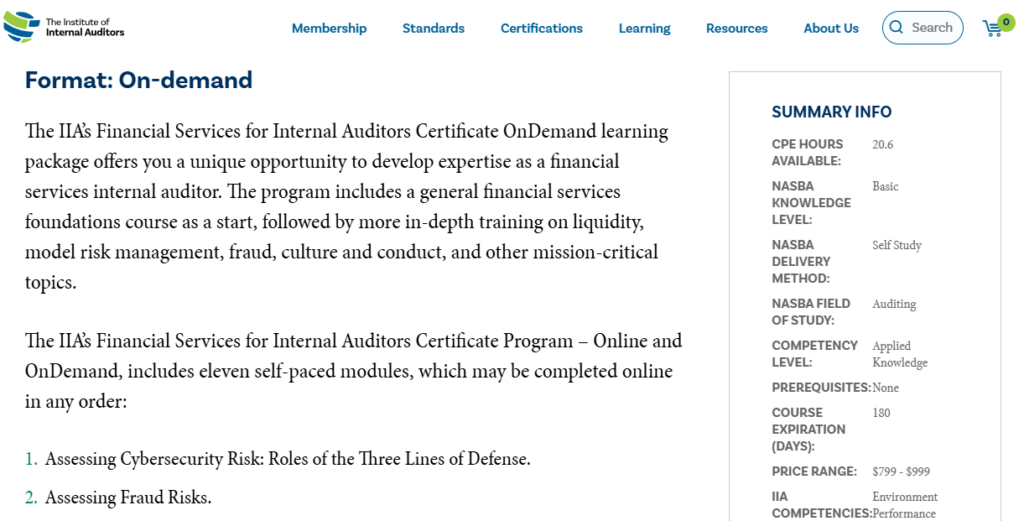
The Financial Services for Internal Auditors Certificate (FSAC) is a self-study, on-demand learning program provided by The Institute of Internal Auditors (IIA). It is designed to enhance skills in financial services auditing through a comprehensive curriculum that includes a foundational course and eleven self-paced modules.
Issued by: The Institute of Internal Auditors (IIA)
Focus:
- Liquidity
- Fraud
- Risk management
Prerequisites:
- Education: Not required
- Work Experience: Not required
- Exam: Must complete the online exam within 90 days of finishing the course
- Other Certifications Required: None
Renewability: No.
Price: From $799-$999
Who It’s For: Chief audit executives, internal audit managers, and auditors who are aiming to enhance their proficiency in financial services auditing.
FAQs About Accounting Certifications
What is the value of obtaining an accounting certification?
Obtaining an accounting certification can significantly enhance a professional's credibility and career prospects. Certifications such as CPA (Certified Public Accountant), CMA (Certified Management Accountant), and ACCA (Association of Chartered Certified Accountants) can open doors to higher-level positions, increase earning potential, and provide recognition of expertise in the field.
How long does it typically take to earn an accounting certification?
The time it takes to earn an accounting certification varies depending on the specific certification and the individual's prior education and experience. For example, becoming a CPA generally requires completing 150 credit hours of education, passing a rigorous exam, and meeting specific state requirements, which can take several years. On the other hand, certifications like the CMA may take about 6-12 months of preparation and exam completion.
Are accounting certifications internationally recognized?
Some accounting certifications are internationally recognized, allowing professionals to work in various countries. The ACCA, for instance, is recognized globally and provides flexibility for professionals seeking international opportunities. However, certifications such as the CPA might have specific state or country requirements that need to be fulfilled to practice in certain regions.
What are the prerequisites for pursuing an accounting certification?
Prerequisites for accounting certifications often include a combination of educational qualifications, work experience, and passing relevant examinations. For example, the CPA certification requires a bachelor's degree in accounting or a related field, completion of specific credit hours, and passing the CPA exam. It is essential to check the specific requirements for each certification, as they can vary.
How do accounting certifications impact career advancement?
Accounting certifications are often critical for career advancement as they demonstrate expertise and commitment to the profession. Certified professionals may have better job prospects, opportunities for promotions, and the ability to negotiate higher salaries. They also often have access to a broader network of industry professionals and resources.
Other Useful Resources
Here are a few other useful resources to check out:
- Accounting software for accountants guide
- Best accounting courses
- Guide to the best accounting books
What's Next?
Ready to compound your abilities as a finance professional? Subscribe to our free newsletter for expert advice, guides, and insights.

